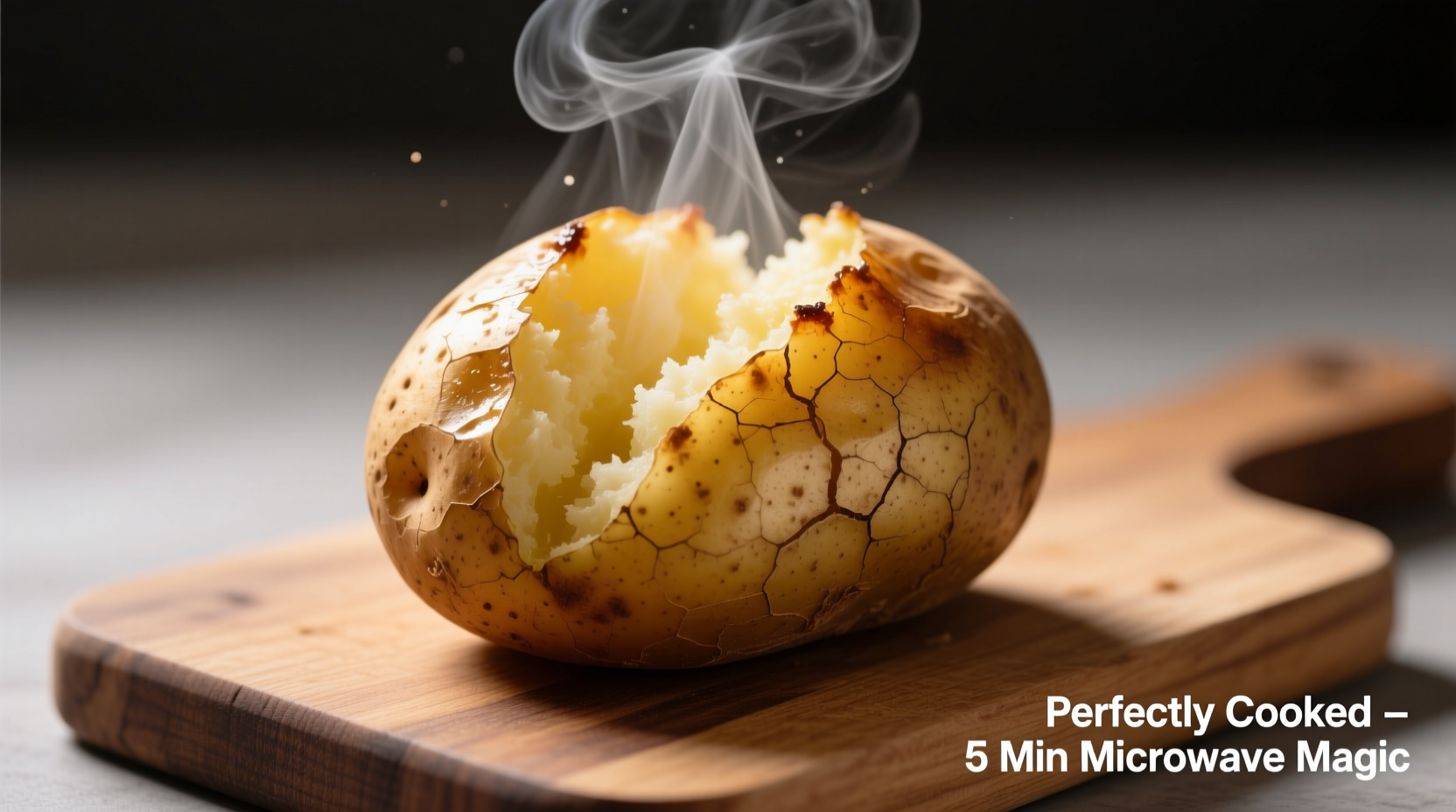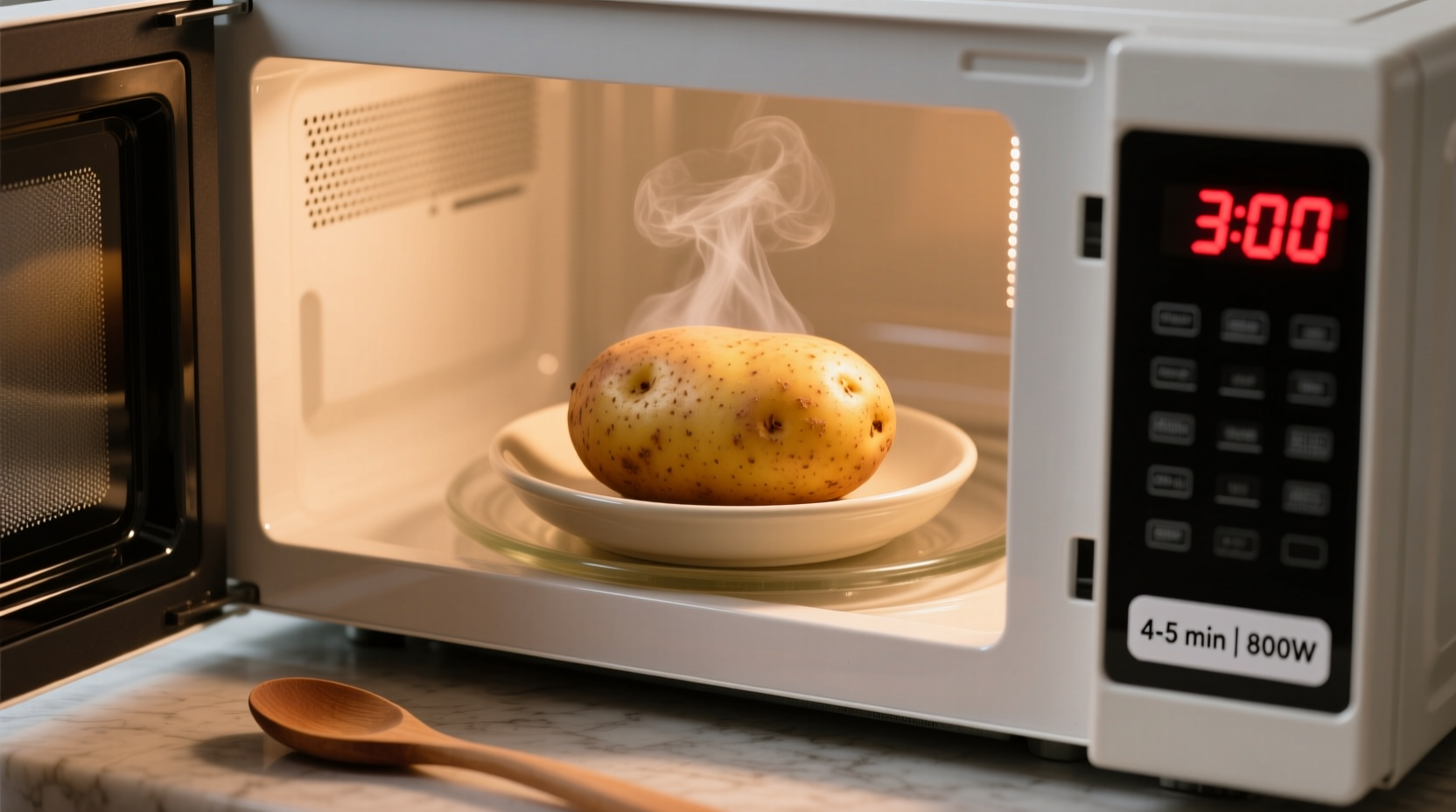Quick Answer: Microwave a medium-sized potato for 5-7 minutes per side, rotating halfway. Larger potatoes may need 8-10 minutes total. Always pierce the skin first and check internal temperature reaches 210°F (99°C) for perfect results.
The Fastest Way to Perfect Microwave Baked Potatoes
When you're craving a fluffy baked potato but don't have time for the oven's 45-60 minute bake, your microwave becomes the ultimate kitchen hero. This guide delivers precisely calibrated timing based on potato size and microwave wattage—no more guessing games or undercooked centers.
Why Microwave Beats Oven for Busy Cooks
Modern microwave technology has evolved far beyond reheating leftovers. For baked potatoes specifically, microwaving offers significant advantages:
- Time savings: Cook in one-third the time of conventional baking
- Energy efficiency: Uses approximately 80% less energy than oven baking
- Moisture retention: Proper technique prevents the dryness common in oven-baked potatoes
- Consistent results: Eliminates hot spots that cause uneven cooking in conventional ovens
According to the U.S. Food and Drug Administration, modern microwaves distribute energy more evenly than ever before, making them reliable for precise cooking tasks when used correctly.
Step-by-Step Microwave Baking Process
Preparation: The Critical First Step
Proper preparation prevents explosions and ensures even cooking:
- Wash thoroughly: Scrub potatoes under running water to remove dirt
- Pierce strategically: Use a fork to make 8-10 deep punctures (USDA Food Safety guidelines require this to prevent steam buildup)
- Dry completely: Moisture on skin creates steam pockets that can cause uneven cooking
- Optional enhancement: Rub with olive oil and sprinkle with salt for crispier skin
Timing Guidelines by Size and Wattage
| Potato Size | 600-700W Microwave | 800-900W Microwave | 1000W+ Microwave |
|---|---|---|---|
| Small (4-6 oz) | 4-5 minutes | 3-4 minutes | 2.5-3.5 minutes |
| Medium (6-8 oz) | 6-8 minutes | 5-7 minutes | 4-6 minutes |
| Large (8-10 oz) | 8-10 minutes | 7-9 minutes | 6-8 minutes |
| Extra Large (10+ oz) | 10-12 minutes | 9-11 minutes | 8-10 minutes |
Note: Always rotate potatoes halfway through cooking time for even heating. This technique addresses the FDA's recommendation for preventing cold spots in microwave cooking.

Checking for Perfect Doneness
Timing alone isn't enough—proper doneness verification ensures food safety and ideal texture:
- Temperature check: Insert an instant-read thermometer into the thickest part—should register 210°F (99°C)
- Squeeze test: Carefully (they're hot!) squeeze the potato—it should yield slightly with soft resistance
- Visual cue: Skin should appear slightly wrinkled with steam escaping from pierce points
The USDA Food Safety and Inspection Service confirms that potatoes must reach an internal temperature of at least 210°F to ensure complete cooking and eliminate potential pathogens.
Finishing Touches for Restaurant-Quality Results
What separates a decent microwave potato from an exceptional one? These professional techniques:
- Resting period: Let potatoes stand for 2-3 minutes after cooking—this allows residual heat to finish cooking the center evenly
- Steam release: Make a small slit in the top to release excess moisture before adding toppings
- Butter absorption: Add a pat of butter immediately after cutting open—the residual heat melts it perfectly into the fluffy interior
- Texture enhancement: For crispier skin, finish under the broiler for 2-3 minutes after microwaving
Troubleshooting Common Issues
Even with perfect timing, problems can occur. Here's how to fix them:
- Soggy skin: Result of excess moisture—always dry potatoes thoroughly before cooking and avoid wrapping in plastic
- Hard center: Indicates undercooking—add 1-2 minute increments and check temperature
- Exploded potato: Caused by insufficient piercing—always make 8-10 deep punctures with a fork
- Dry texture: Overcooking is the culprit—reduce time by 30-60 seconds next time
Safety Considerations You Shouldn't Ignore
Microwave cooking requires specific safety practices:
- Never microwave potatoes without piercing the skin (risk of explosion)
- Use oven mitts when handling cooked potatoes—they're significantly hotter than the microwave interior
- Allow proper standing time before cutting to prevent steam burns
- Discard potatoes left at room temperature longer than 2 hours (per USDA food safety guidelines)
When to Choose Microwave Over Traditional Baking
While microwave baking excels for speed, understanding its limitations helps you choose the right method:
- Choose microwave when: Time is limited, cooking single portions, or seeking maximum moisture retention
- Choose oven when: Preparing multiple potatoes simultaneously, wanting maximum crispiness, or cooking for special occasions
Food science research from the National Center for Home Food Preservation shows microwave cooking preserves more water-soluble nutrients like vitamin C compared to conventional baking, making it both faster and potentially more nutritious.











 浙公网安备
33010002000092号
浙公网安备
33010002000092号 浙B2-20120091-4
浙B2-20120091-4